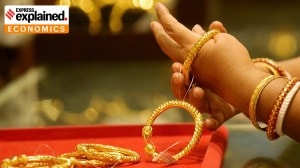THANK YOU FOR THE MUSIC
We may not sing ABBA songs in the shower anymore, but Mamma Mia! the movie has revived interest in the pop group’s irresistible melodies

We may not sing ABBA songs in the shower anymore, but Mamma Mia! the movie has revived interest in the pop group’s irresistible melodies
My nine-year-old son asked me the other morning why I was dancing around the breakfast table singing Take a Chance on Me. I don’t usually sing in the morning. I definitely don’t dance. And I didn’t know I knew any ABBA songs (I’ve never actually bought an album), but there they were—S.O.S, Dancing Queen and Mamma Mia—bouncing around in my subconscious, like unmoored neurons, suddenly revitalised by an infusion of Mamma Mia!, the big-screen adaptation of the musical, which I’d seen the night before.
The movie stars a singing-dancing over-all-clad Meryl Streep, Amanda Seyfried (the young beauty from HBO’s Big Love) as her daughter, and a dream team of middle-age men that women still want to sleep with: Pierce Brosnan, Colin Firth and Stellan Skarsgard. The three guys are called to a Greek isle by the daughter, who believes one of them is her father, but she’s not sure which one. Ah, the ’70s.
Mamma Mia! is an international sensation, with albums in a multitude of languages and an estimated $2 billion in gross ticket sales. Every night, roughly 17,000 people watch Mamma Mia! somewhere in the world, joining the more than 30 million who have already seen it. In their barnstorming to promote the film, Streep and company have hit locales such as London, Melbourne, Australia, Stockholm, Sweden and a gigantic junket in Athens. The film has already opened No. 1 in the UK, Australia, Sweden, Norway, Denmark and Greece, where the movie was shot. It also premiered strongly in Iceland, New Zealand, the Middle East and the Philippines. Total take in 12 international markets? A strong $24.3 million. “It’s huge abroad,” says Universal President Donna Langley. “It’s a multibillion-dollar franchise worldwide. We were pursuing the rights probably as long as the show has been running in the UK.”
I recently asked Judy Craymer, the impresario behind the musical and the movie, whether she ever finds herself singing ABBA songs in the shower. “Not anymore,” she says. But if Dancing Queen comes on, “I might dance around a bit,” she admits. “It’s pretty irresistible.” However, she denies having “a picture of Bjorn and Benny on my walls”. That would be Benny Andersson and Bjorn Ulvaeus, the songwriting duo behind ABBA, which has sold 370 million albums worldwide. Craymer met the duo back in early ‘80s, when she was working for lyricist Tim Rice, and they were all making the 1983 musical Chess. About getting them to agree to the musical Mamma Mia!, she says, “It was the years of trust. They got to know me, which is how I convinced them that this would work.”
With a basic idea in her head about an intergenerational musical about women, Craymer enlisted Catherine Johnson, a struggling single mom who’d written a musical that was never produced because she didn’t have the rights to the music. Says Craymer, “She had a great understanding of music and ABBA songs and a lack of pretension. We were both so broke we had nothing to lose.” The duo was later joined by Phyllida Lloyd, a prominent opera director. After the success of the musical, which premiered in London in 1999, Craymer initially turned down all of Hollywood’s entreaties, in part to let the show run its course. But she also was adamant that if there was a movie version, the trio would make it themselves and would keep control.
Of course, the movie idea really got a boost, and became an inevitability, when Streep became interested. Craymer and company had made a pact never to use big-name actors in the stage production, because the ABBA songs were the star, but were willing to take a chance with the movie version. Craymer says, “We kind of knew Meryl had a great belt and a great voice.”
And then there was the letter that Streep wrote to the Broadway cast after seeing the show in 2001. It said, “I loved the show so much. I took my daughter, and much to my children’s embarrassment, I wanted to go on stage afterward to feel what it was like,” recalls Craymer. “It came on Meryl Streep paper. We all kept copies like school girls, and it stayed pinned on the notice board backstage forever.”
-Rachel Abramowitz






- 01
- 02
- 03
- 04
- 05

























